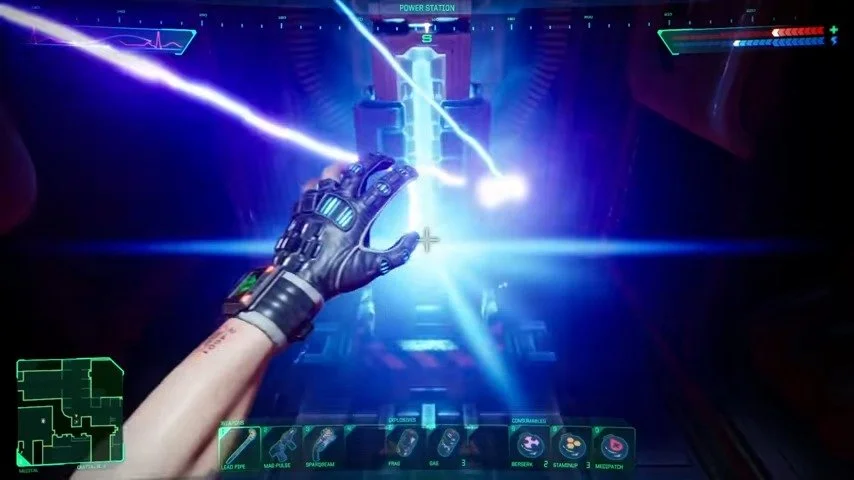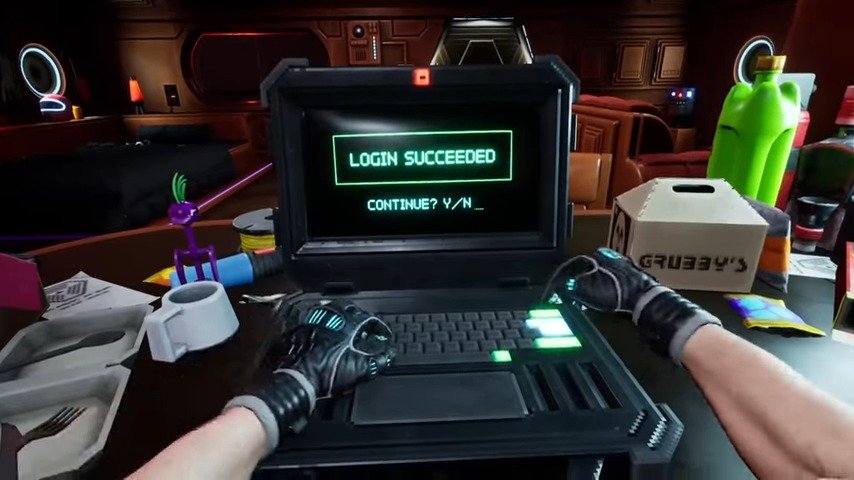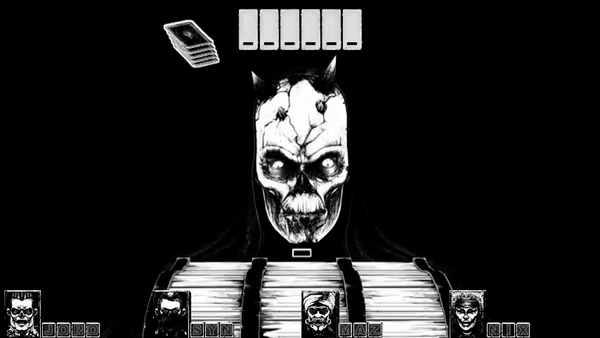Nightdive Studios and Prime Matter have resuscitated the cult classic that inspired a slew of games after it. System Shock revolutionized gaming and helped thrive the immersive sim genre. It inspired the likes of BioShock, Dishonored, and Prey. It was released back in 1994 and now, nearly 30 years later, it has been completely rebuilt for a modern audience but maintains the essence and “spirit” of the original title.
Story
The year is 2072, you are a highly skilled hacker where civilization has progressed its technological advancement to the highest degree of capability. Cybernetics that can be plugged into your body, robots performing mundane tasks to assist humans, and interplanetary space travel. All of these things are a reality. The game begins with you in your apartment, commencing a hack on the largest tech giant to gain sensitive information for your own motives. Until your apartment gets raided by a squad of rifle-bearing security and your journey begins.
You have been captured by the CEO of the very same tech giant you were stealing from. He makes a plea with you, to give you what you want, in exchange for your services. He orders you to remove the morality algorithm from the advanced A.I., SHODAN. Upon doing so, you are knocked out and when you come to, you awaken in a medical bed inside Citadel Station, an advanced space station orbiting Saturn. A space station that has been overtaken by the chaotic SHODAN AI that seeks to purge the human race to its liking. All thanks to you. You now have to fight for survival and face horrific threats, alone.
Gameplay
System Shock is a first-person immersive sim with a strong emphasis on exploration and non-linear narrative progress. Now, you may think non-linear may reference an “open-world” type of story progression but that’s not exactly the case. Citadel Station has multiple floors ranging from Medical, Research, Maintenance, and many others. When beginning the game, you wake up in the Medical Bay and have to figure out how to escape and progress through the station.
There is no guiding arrow or objective list. Instead, everything is discovered by data disks and audio logs found throughout the station. For anyone familiar with the BioShock formula, exploring is a necessity to unravel the plot and discover new weapons and abilities. Without the use of a guide, the game forces you to use your witt to figure out what needs to be done next. Reading data disks and listening to audio logs are the only way to know what actions need to be taken to progress. Sometimes you will walk into a room and find a code to unlock a door that contains precious loot.
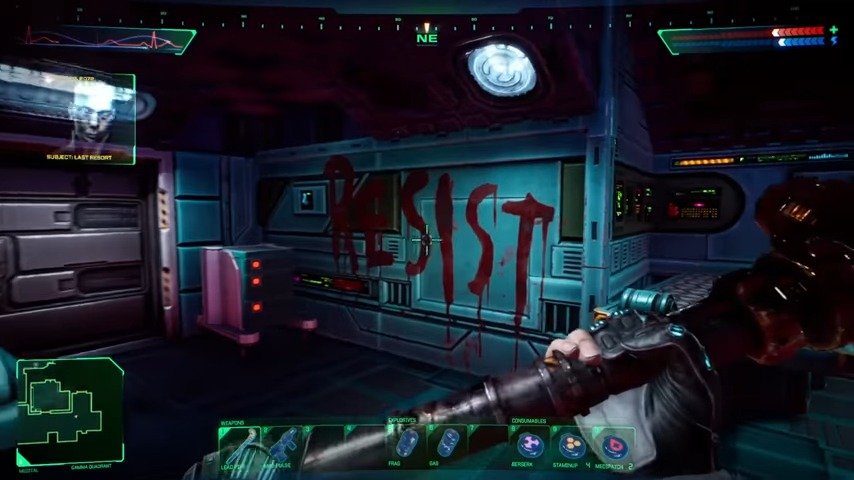
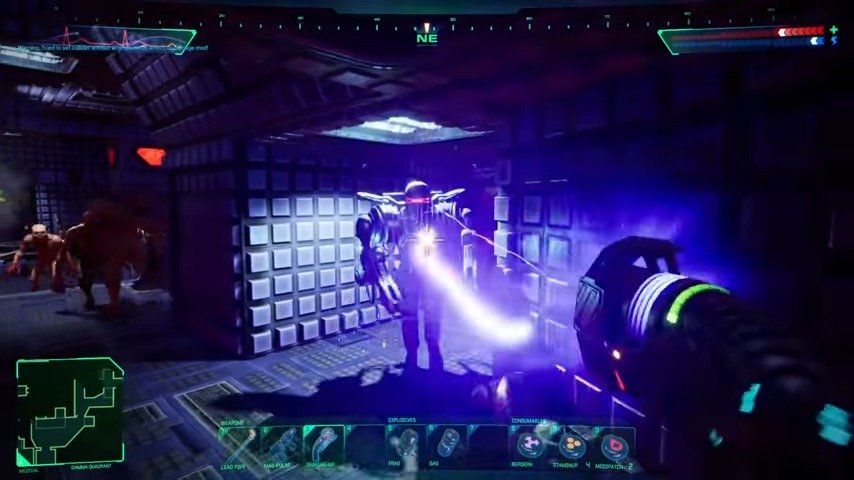
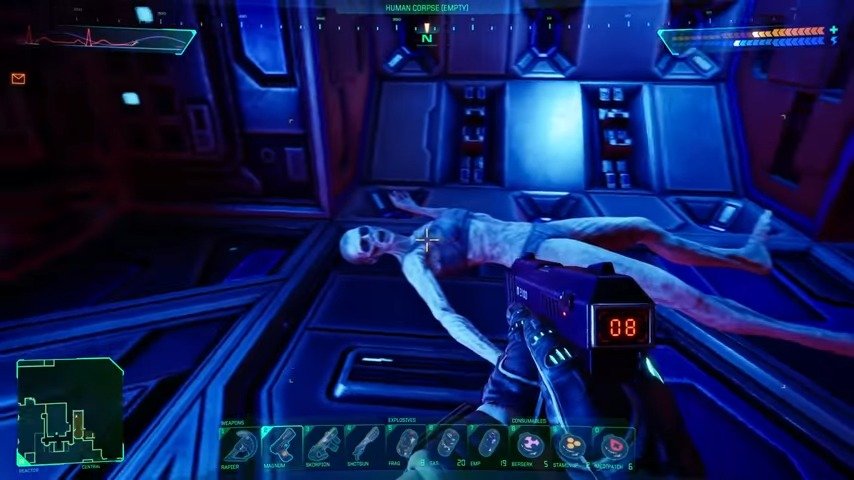
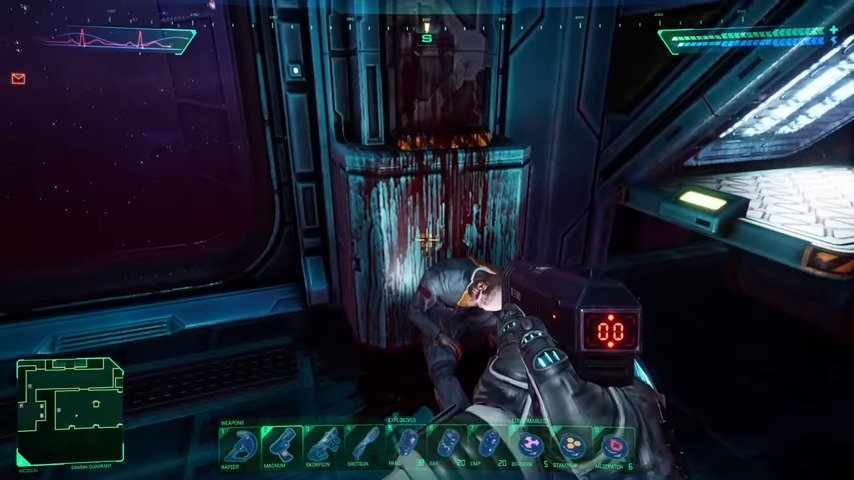
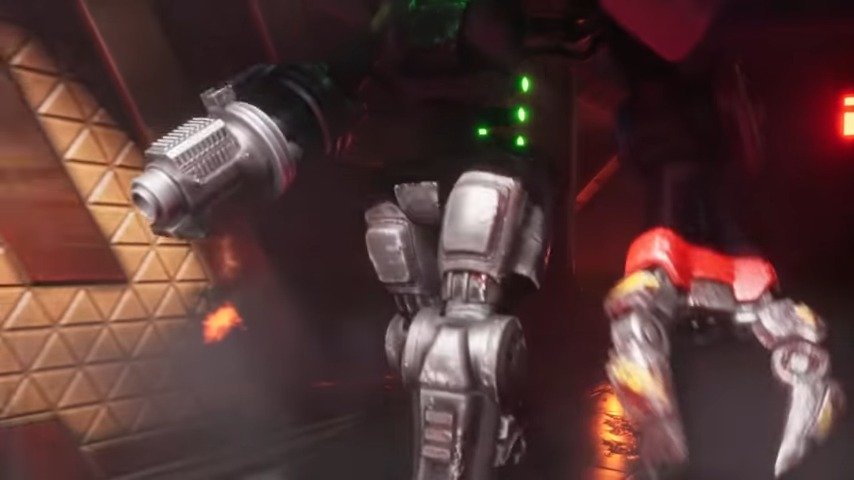
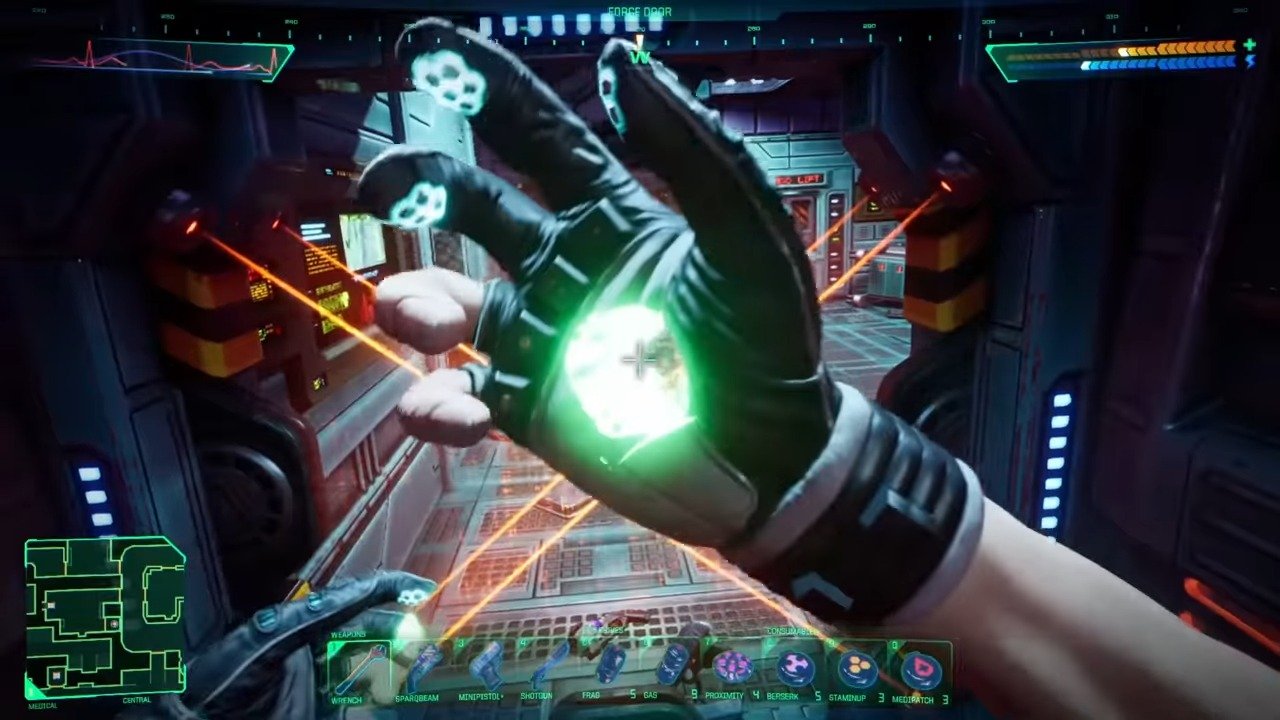
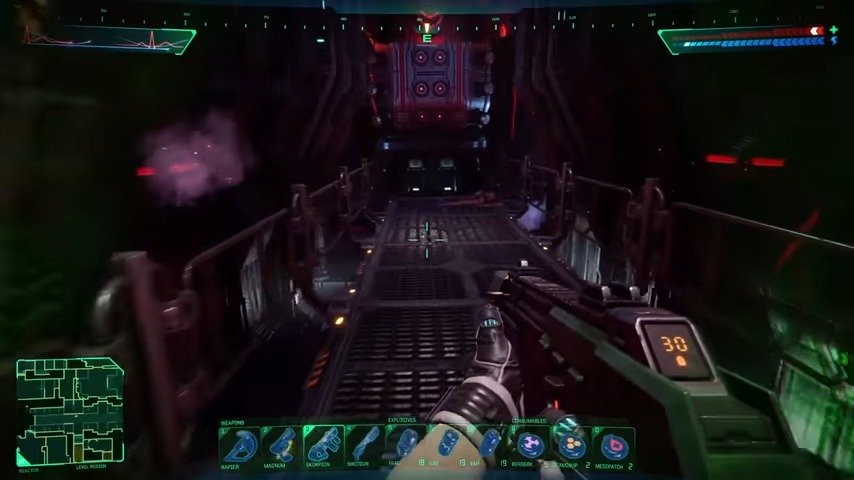
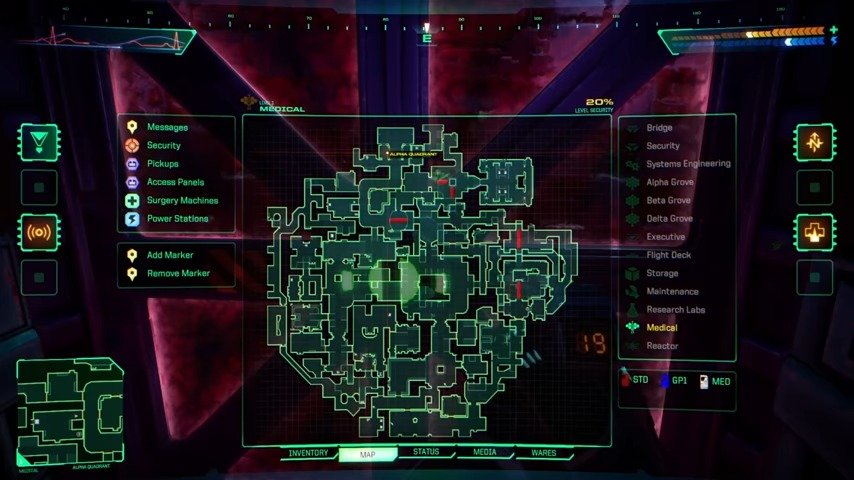
Although the Citadel Station is secluded, it is quite vast and the unknown of what’s behind every corner makes the exploration invigorating. It does not feel like you wander around aimlessly, it just simply feels like you are trying to figure out how to get the hell out of there, but discovering new elements along the way. It is a great flow that keeps the game feeling exciting all the way to its end.
The combat gives you enough to experiment with and most of the fun comes from discovering what weapons work best against a variety of enemies. Melee weapons, pistols, rifles, energy weapons, and grenades all have various damage outputs and work best against specific enemies. EMP grenades are devasting to anything cybernetic but the lead rounds pistol works great for humanoids.
On your visit to Citadel Station, you will encounter many humanoids, cyborgs, and robots that are all under the control of SHODAN. A virus has spread throughout the colony of humans on board, turning them into mutated flesh-eating monsters. Then there are the cyborgs that SHODAN has created from the human bodies on board. Taking their dead corpse and infusing them with cybernetics to carry out the will of SHODAN’s vision. It is a grim theme and gives you more of a reason to put an end to it all.
Then we have the robots. Which come in various sizes and use a multitude of weaponry against you. System Shock can be punishing if you do not manage your inventory, much like BioShock, you need medkits, food, or a healing bed to rejuvenate the life you lost. There are a limited number of healing beds on the station which could require you to backtrack to a previous floor if you are in a tight spot with low health. It may sound irritating but it actually works well with the immersion. Thankfully, there are vending machines scattered throughout the station to help ease the pain but it’s at the cost of precious credits.
There are rejuvenation chambers scarcely scattered throughout the station that are used to convert human corpses into evil cyborgs. If you hack these machines, you can use them to respawn when you die, instead of forcing a reload. I didn’t find myself using these stations too much, since you can freely save your game at nearly any point as long as there are no enemies nearby. But it does make things easier when you forget to save at a crucial point.
SHODAN serves as the evil AI that is hell-bent on exterminating the human race. It is using humanity to help with the process and ultimately work its way through space in search of human civilization. Quickly, the stakes are raised and your fight for survival becomes humanity’s. What will you do? The game has moments that allow you to fully interact without any safety precautions for the sake of protecting the narrative. For example, early on in the game, you can activate a devasting laser that destroys Earth, instantly giving the player a game over. All of this could have been avoided if I just listened to the audio log on the desk instead of immediately pushing the shiny green button. This immediately made me realize that I need to slow down and take in everything the game had to offer, ramping up the immersion.
Weapons can be upgraded with mods, allowing for them to have better aim stability, higher ammo capacity, or an increased rate of fire. Some weapons have different ammo types that are effective against specific types of enemies, forcing the player to strategize on the fly. I enjoyed this combat flow from BioShock, which is the spiritual successor to the original System Shock, and it works well here.
The Citadel Station is also littered with hack puzzles that can unlock doors or engage power to a section of the ship. These puzzles are usually optional and some can even be skipped if you find the access keycard to unlock the panel. There is also a gadget that can be found that allows you to instantly hack the panel but it is a one-time use, so use those wisely! I found myself really enjoying these puzzles, which seemed more intricate than the likes of BioShock’s flow tubes. So bravo to Nightdive for upping the ante in the puzzles.
Entering Cyberspace is a minigame that turns the game into a 3D bullet hell. You jack into the Citadel Station’s security network with the goal of disabling locked areas or sometimes progressing through the level. You must fight off the system’s virtual defensive bots and destroy the core(s) that regulate the locked system. These frantic minigames were a nice change of pace compared to the methodical gameplay that is present throughout the narrative.
The highlight of this game, however, is the level of immersion. This is a great example of how a narrative-driven simulator should be. Give the player the freedom and tools to do as they wish, but do not hold their hand. Let the player discover the game for themselves and experiment with different weapons to see what works best in different scenarios. This is the beauty of System Shock and it proves that we need more titles like it.
Audio and Visual
The game has a distinct ’90s retro tune that stays ominous at the right times and upbeat when things get hectic. Everything from the aesthetic of the UI to the in-game soundtrack matches the setting and theme of a dystopian futuristic world. The graphics are infused with a combination of modern fidelity and retro visuals which looks very unique and appealing. Instead of going full fledge hyper-realistic, Nightdive decided to keep the game’s retro feel by implementing the jagged retro-bit look for very up close details. It is a bit odd at first but it plays into the whole - modern retro remake feel very well. The game looks great and runs very well on PC with no glitches or stability issues on the mid-tier machine I was playing on.
Replayability
System Shock is a single-player game and it does provide multiple difficulty levels. However, what is unique about this title is that it allows you to adjust the difficulty of specific settings. Combat, Puzzles, and AI can all be adjusted to your preference. My first playthrough was on the medium difficulty for all 3 settings but I am currently playing a second playthrough on hard to amp up the challenge. Puzzles become more intricate, enemies output more damage, and they can easily spot you.
What It Could Have Done Better
System Shock does a lot right but I do wish the enemies felt more varied and unique. One key factor for me is the enemy animations. I wish these were more fleshed out. I understand the robotic movements make sense in a game where you fight robots and cyborgs, but it can look a bit stiff at times. Hallways are narrow, not giving much room to move around to begin with, but all enemies just strictly come full force toward you. It would be great to have an elusive enemy that stalks you or has a quick movement. But all of the enemies feel like they behave the same, but come in different sizes and use different weapons.
Verdict
This title is a faithful remake of the original that was released in 1994 that revitalizes immersive simulators. It has been completely reimagined for a modern audience but maintains its core essence without sacrificing what made the original special. That is the magic recipe for making an excellent remake and this entry will help grab the attention of modern gamers to the series. Fans of BioShock and Dishonored will feel right at home with System Shock and I’m sure they will be eager to play the enhanced edition of System Shock 2 when it releases.
System Shock launches on May 30th for PC via Steam. It will also be available on PlayStation 5, PlayStation 4, Xbox Series X|S, and Xbox One at a later date.
